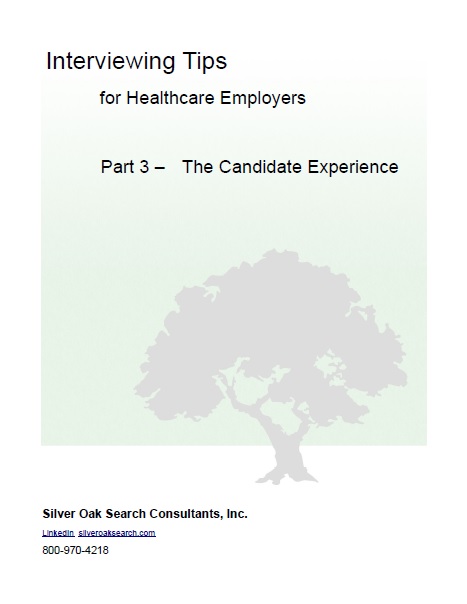Healthcare organizations seek to improve their services, processes and operations by understanding the patient, physician and employee experiences. Similarly, your interview process, your ability to attract and hire candidates, can be improved by understanding the Candidate Experience.
For the purposes of this paper, the Candidate Experience includes all the interview interactions the candidate has with you, members of the Interview Team and anyone else who will influence their perception of your organization. It is about much more than a series of interview conversations.
This paper is the third of a three part series, “Interviewing Tips for Healthcare Employers.” If you’ve read “Part 1: Organizing and Preparing an Interview Team” you understand how to develop a well coordinated candidate selection process for your organization. Then “Part 2: Questions to Ask Candidates,” provided suggestions to help you develop the profile of the ideal candidate to improve your ability to hire the right person for your organization.
Finally, this paper, “Part 3: The Candidate Experience,” includes suggestions for developing a positive recruiting and hiring culture to engage, attract and successfully hire outstanding leadership candidates. This requires a commitment to build, monitor and constantly improve a quality Candidate Experience.
This paper focuses on the portion of the Candidate Experience that begins with the submission of a job application and does not include any preceding contact between the candidate and prospective employer. In addition, this paper does not discuss the impact of social media on the hiring process.
The Candidate Experience is affected by factors that determine how a candidate views your organization and have the potential to negate anything they learn during the interview.
Included in this paper are reminders of how to be the best host before, during and after the on-site interview.
Candidate Experience Stories
Remember, while you are determining whether the candidate is right for your organization, the candidate is determining whether your organization is right for them.
Consider the following real-life experiences of highly desired, masters prepared, director-level candidates:
- You are taken to a hallway with one office door. It’s closed and you are told that your next interviewer will be off the phone shortly. You sit alone for 1 hour and 20 minutes. Finally, someone returns to collect you – no interview, explanation or apology. Result: offer declined due to “disregard for my time and effort.”
- You wait in your hotel lobby as directed by the interview agenda for a ride to a 6:30AM breakfast meeting. This interview meeting is with surgeons who will drop-in before and after surgeries. You miss the meeting after no one picks you up. Result: offer declined due to “lack of organization.”
- You decide to visit the hospital the evening before the interview and encounter a distressed and obviously confused family. After observing the family being ignored by several employees who appear to purposely avoid eye contact with them, you help the family find where they needed to go. Result: offer declined due to “questionable culture.”
- A member of the Interview Team tells you that your prospective boss has a bad reputation and advises against taking the job. Result: candidate withdrew due to “toxic political environment” prior to offer being extended. (The hospital later learned that this employee had done this twice before resulting in all three candidates withdrawing.)
Mistakes happen and candidates understand when the unexpected occurs. However, in these situations, the organization was unable to hire the person they were seriously intent on hiring, had spent months of effort to identify and had spent money for the on-site interview.
Improving the Candidate Experience
The interaction between a candidate and prospective employer can be viewed as a process that begins with the submission of a job application. The process then proceeds through several interviewing steps including phone and on-site interviews.
However, viewing candidate interactions as only steps in a process, as opposed to a Candidate Experience, can leave you operating in a vacuum without understanding the candidate’s true impression of your organization.
This a short excerpt from the 15 page paper The Candidate Experience.
Get Your Copy by Email Now
(We’ll never sell, give away or spam you.)

